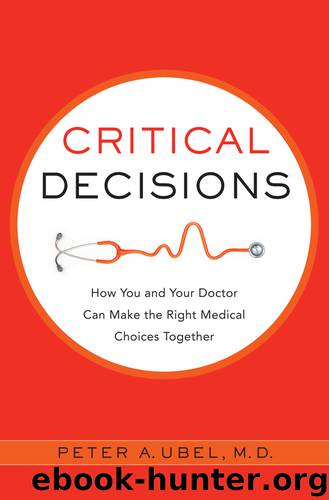Critical Decisions by Peter A. Ubel

Author:Peter A. Ubel
Language: eng
Format: epub
Publisher: HarperCollins
Published: 2012-08-09T16:00:00+00:00
Part III
From Empowerment to Partnership
Chapter Eight
Getting Good Advice
Isaac Palmer lay in his hospital bed at the Mayo Clinic only remotely aware of his surroundings, a wide range of colon cancer metastases having thrown his metabolic functions into disarray. I spoke with his two children, explaining that his cancer was incurable. Because they were his next of kin, I told them they would be responsible for deciding which interventions their father would receive, as long as he remained too confused to decide for himself. We spoke for a few minutes about his dire situation, a conversation that went as well as can be expected given the difficult topic at hand. (It is never easy to tell anyone that their dad is dying.) Then I turned the conversation toward an even more difficult topic. As the medical resident caring for Mr. Palmer, it was my job to discuss his DNR status, to determine whether his children were in favor of a Do Not Resuscitate order.
The medical literature had taught me that metastatic cancer and cardiopulmonary resuscitation (CPR) were a dismal combination. Generally, when patients with metastatic cancer experience cardiac arrests—when their hearts stop—almost nothing can bring them back to life, meaning the patients will die despite the frantic, sleep-deprived efforts of the code team. Moreover, in those rare cases when CPR does restart these patients’ hearts, they still aren’t likely to survive their hospital stays, because their cardiopulmonary systems inevitably shut down again as their cancers progress. My goal, then, in discussing CPR with Palmer’s two children was to help them understand its futility, so they would endorse a DNR order, thereby saving all of us from putting him through the horrors of a “code red.”
I struck a pedagogical pose and described the situation. “Your father’s cancer is incurable,” I explained. “We have no more chemo to offer. And even though we’ll try to treat his kidney problem, he may be too sick to recover.” They nodded their heads in sorrowful acknowledgment while I continued doling out bad news. “And if your dad’s illness progresses, and his heart and lungs stop working, I don’t think he’d survive resuscitation.”
“We understand,” said his son. His daughter remained mute, but between dabs of her handkerchief, she nodded yes to her brother’s pronouncement. I was confident now that I’d accurately informed them of the situation and that the time was right to ask them to make a decision.
“So,” I continued, “if his heart stops, would you want us to try to restart it?”
Their body language suddenly changed. I was no longer simply informing them about their dad; I was now soliciting their opinion about his care. “What are you asking, Doctor?” said his son.
“I’m asking whether you want your dad to be DNR, meaning that if his heart stops, we will not try to restart it with CPR.”
“Well, I don’t want Dad to die,” his daughter blurted out, distressed now with the direction of the conversation.
“Of course you don’t,” I said as compassionately as possible. “I’m just asking whether, if he does die—I mean if his heart and lungs stop working.
Download
This site does not store any files on its server. We only index and link to content provided by other sites. Please contact the content providers to delete copyright contents if any and email us, we'll remove relevant links or contents immediately.
Periodization Training for Sports by Tudor Bompa(8271)
Why We Sleep: Unlocking the Power of Sleep and Dreams by Matthew Walker(6725)
Paper Towns by Green John(5190)
The Immortal Life of Henrietta Lacks by Rebecca Skloot(4588)
The Sports Rules Book by Human Kinetics(4386)
Dynamic Alignment Through Imagery by Eric Franklin(4217)
ACSM's Complete Guide to Fitness & Health by ACSM(4060)
Kaplan MCAT Organic Chemistry Review: Created for MCAT 2015 (Kaplan Test Prep) by Kaplan(4012)
Livewired by David Eagleman(3772)
Introduction to Kinesiology by Shirl J. Hoffman(3769)
The Death of the Heart by Elizabeth Bowen(3621)
The River of Consciousness by Oliver Sacks(3604)
Alchemy and Alchemists by C. J. S. Thompson(3520)
Bad Pharma by Ben Goldacre(3427)
Descartes' Error by Antonio Damasio(3278)
The Emperor of All Maladies: A Biography of Cancer by Siddhartha Mukherjee(3162)
The Gene: An Intimate History by Siddhartha Mukherjee(3098)
The Fate of Rome: Climate, Disease, and the End of an Empire (The Princeton History of the Ancient World) by Kyle Harper(3067)
Kaplan MCAT Behavioral Sciences Review: Created for MCAT 2015 (Kaplan Test Prep) by Kaplan(2986)
